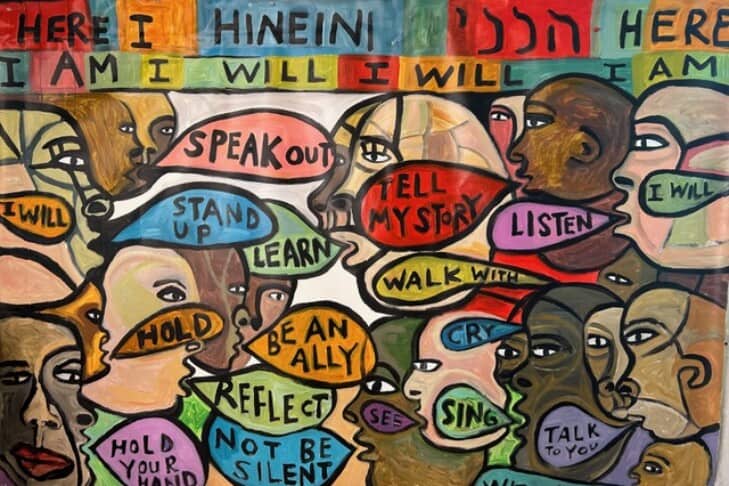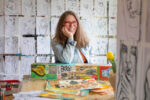Local artist Deb Putnoi and management consultant and art dealer Karl McLaurin have joined forces to bring an art exhibit to Boston City Hall this month called “Forgotten Alliances: Blacks and Jews.” Mounting the exhibit together, which features Putnoi’s multicultural and multicolored paintings, is another natural alliance in their lifelong friendship.
Putnoi and McLaurin met in kindergarten. McLaurin’s family, who moved from Brooklyn to Newton, were among the few Black people living in the city at the time. McLaurin’s father, a doctor, came to Boston on a Harvard University fellowship. The move resulted in McLaurin often being the only Black child in his class. However, he credits the Putnoi family with his soft landing at school and beyond.
He and Putnoi talked to JewishBoston about their enduring and extraordinary friendship and the genesis and execution of “Forgotten Alliances: Blacks & Jews.” The exhibition’s opening event is Thursday, Feb. 16, at Boston City Hall.
McLaurin came to the project as the principal of Oak Hill Consulting Partners. He worked for eight years as director of marketing at the Department of Housing and Community Development for former Gov. Deval Patrick’s administration. He then founded Oak Hill Consulting, whose portfolio includes management consulting and representing six artists, including Putnoi.
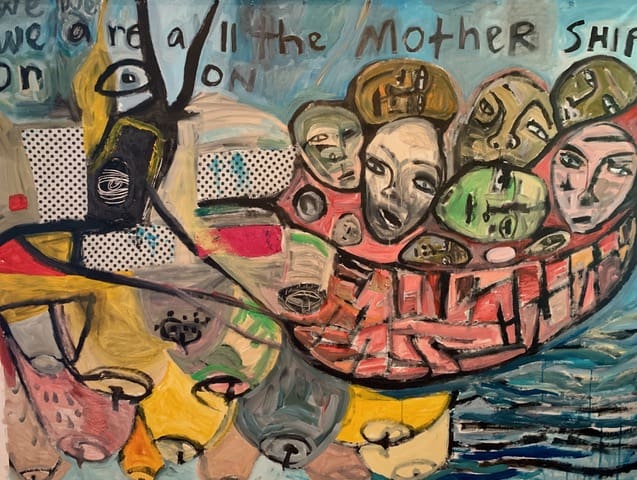
For McLaurin, one of the reasons for organizing the exhibition was the growing racism and antisemitism he observed around him. “I don’t want people only to remember the Kyrie Irvings and Kanye Wests,” he said. “I want them to remember the ‘forgotten alliances’: the civil rights era when Blacks and Jews worked together and even died together. I want Deb’s art to catalyze conversations on social justice so that we remember Blacks and Jews have been aligned for a long time.”
Putnoi and McLaurin remembered the grammar school they attended together in Newton as a place of love and creativity nurtured by dedicated teachers. “My best education was at the Hyde School [in Newton],” Putnoi recalled. “It was very special. We knew there were differences among us, but the families and teachers in the school accepted and cherished each child.”
Related
Putnoi also references her grandfather, a Holocaust survivor, in her work. Her art will often imply or directly questions how another Holocaust can be prevented. Ultimately, she said, she wants her teaching and art to bring people together for a candid and meaningful talk. For example, “We are all on the mothership” is a painting in the show that alerts viewers to the themes Putnoi is exploring. She visualized the entire six-foot by six-foot painting during an acupuncture session. “I saw a vision of a ship, and it came to me that we are all on a mothership,” she said. “I had to go to the studio right away and paint it.” The ship is also a whale populated by many different people surrounded by eyes and the name of the painting written above her figures.
It’s not surprising to Putnoi that depictions and placements of eyes are in much of her work. She hopes her viewers will engage in observation through the senses. And she doesn’t discount the fact that her father is an ophthalmologist. “It’s all about seeing each other,” she said. “The power of sight and noticing is prevalent in ‘I Stand With You.’ I often include text in my work, and in this painting, part of my written message is, ‘I see you. I stand with you.’”
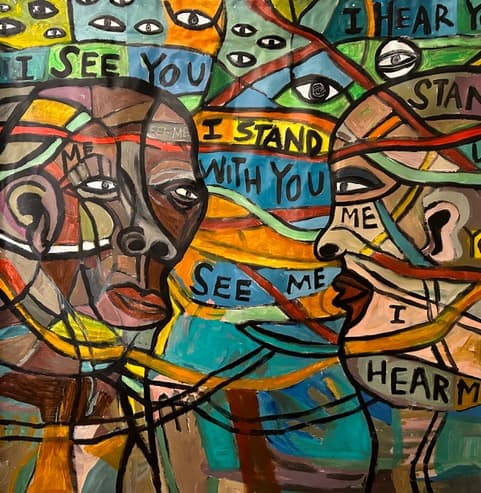
A piece entitled “Hineini,” the Hebrew word for “I am here,” demands viewers be upstanders. Various talking heads implore, “Stand up, speak out, be an ally.” Putnoi referenced Isabelle Wilkerson’s book “Caste: The Origins of Our Discontents,” when she noted, “While we’re not homogeneous, Blacks and whites only began to be classified by the color of their skin in America. Historically, there was no dichotomous skin color or breakdown of color. The eye is so central to understanding race and the art depicting it. It’s evident in Guston’s work, who goes as far as having figures wearing Ku Klux Klan robes.”
For McLaurin, when he learns of another act of gun violence or police brutality involving a Black man, he dreads hearing the hollow phrase “thoughts and prayers.” Instead, he hopes people will take away themes of connection and togetherness in the exhibition to transform thoughts and prayers into concrete action. To that end, Putnoi and McLaurin have developed an ongoing program called #EightGoodDeeds. Eight refers to the number of times Shlomo Noginski, a Chabad rabbi in Brighton, was stabbed outside Shaloh House, a Jewish day school.
The 2021 antisemitic act left the Boston-area Jewish community reeling. “Shaloh House is a block from my studio,” said Putnoi. “When I heard another Chabad rabbi speak at a vigil, I was struck that he called for people to do eight good deeds in a day or a week to bring light into darkness. It was so profound, and I thought people should come together virtually as ‘mitzvah pods’ to transform the number eight into something beautiful and meaningful.”
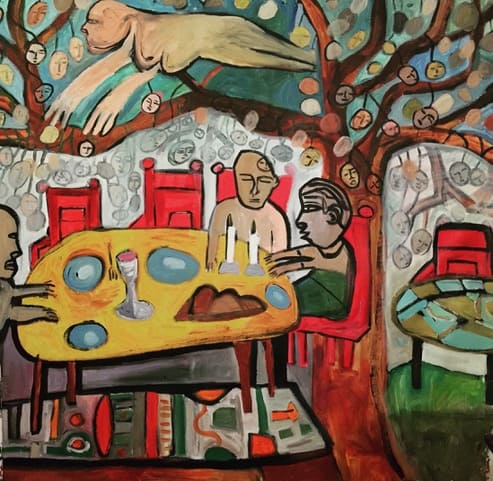
In the exhibition, Putnoi also includes portraits of high school seniors on the cusp of leaving for college. The teenagers who sat for the portraits were Black and white. As she painted, Putnoi, who is trained as an interviewer and facilitator, engaged the teens with questions, including their feelings about leaving home and whether they had experienced antisemitism or racism. She then reflected on their answers in the paintings themselves. “My conversations with these teens were relaxed and candid,” she said. “There is so much competition around them about getting into the ‘right’ school. I wanted to capture what these young people were actually feeling.”
McLaurin compares his friend’s art to soul music. “Soul music is not about Black and white; it’s what is in you,” he said. “So, social justice issues are inside Deb. She’s able to express what is in her subjects’ hearts, and consequently her heart. Those expressions are genuine and God-given.”
“Forgotten Alliances: Blacks and Jews” will be on display in the third floor lobby at Boston City Hall through Feb. 28. The opening event takes place on Thursday, Feb. 16, from 5:30-7:30 p.m.


